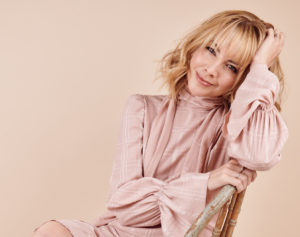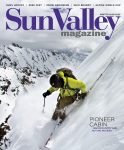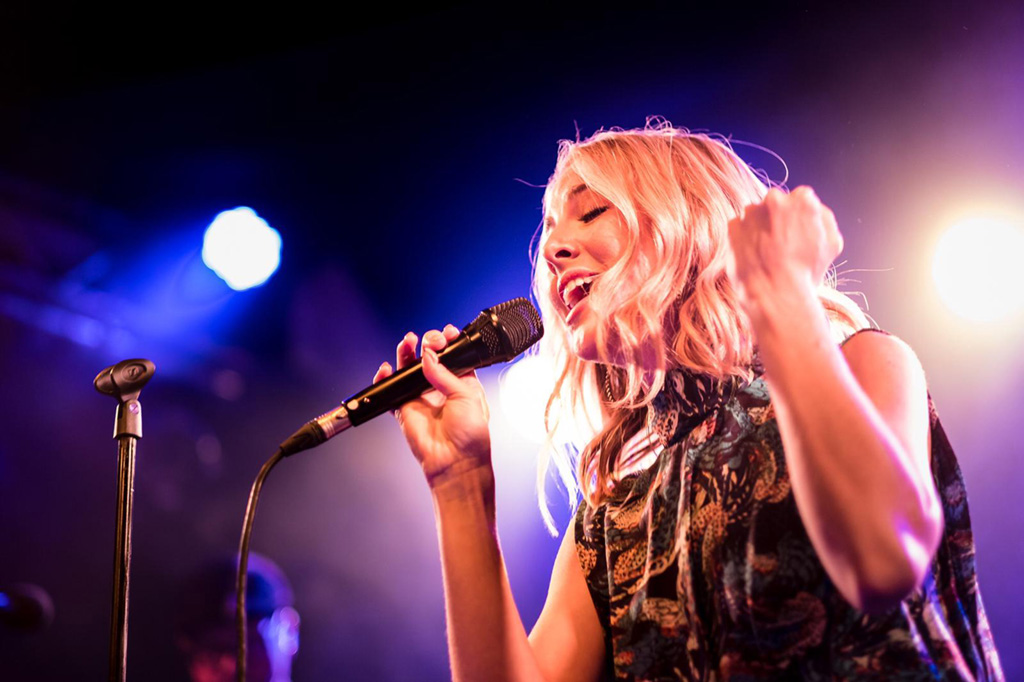“Hi, I’m Morgan, and I’m from Idaho!” With this, singer Morgan James opened her March 17 show, “White to Blue,” at Boise’s Sapphire Room with an effervescent smile, inviting her audience to accompany her on a musical journey through blues, soul, Joni Mitchell and The Beatles, and her own original songs. It was an unforgettable evening as the power of James’ voice and her vocal styling completely rocked the room.
The New York Times has declared her “a phenomenal talent whose feel for classic soul is bone deep … This woman is on fire!” Part of James’ appeal is her connection with her audience and her vulnerability—the willingness to bare her musical soul.
Fan alert: After visiting venues in the East, her “White to Blue” tour will land in Park City on July 6 for the Deer Valley Music Festival. Then on Aug. 17, she will grace the Sun Valley Pavilion stage—transformed into a classical diva—as she sings an evening of Gershwin with the Sun Valley Music Festival (see sidebar). It will be her first visit to the Wood River Valley.
In interviews before and after her Boise show, James shared some of the details of her life in music. While she was born in Boise, James spent her childhood in Pocatello. A New Yorker now, she said that being from Idaho “absolutely informs my level of humility and gratitude.“ She grew up listening to her parents’ record collection of Joni Mitchell, Otis Redding, Sam Cooke, and Crosby, Stills & Nash—all of the classics of that generation. She listened to opera at bedtime.
But it wasn’t until she was 11, when her grandmother bought her a karaoke machine as a present, that she discovered her gift. As she recalled for a 2017 Huffington Post article, “I opened my mouth and a grown woman came out! … I wanted to sound like Joni Mitchell, Mariah Carey, and Aretha Franklin!” And she does. At the same time, she sounds exactly like Morgan James.
James has garnered a lot of well-deserved attention for her covers of D’Angelo, Nina Simone, John Mayer, Nirvana and others. She even recorded a cover of Prince’s “Call My Name.” After he heard it over the phone, he declared, “I love it!” and gave her permission to include it in her album, “Hunter.” The single climbed to No.15 on Billboard’s Adult Urban Contemporary chart.
So how does she manage to cover artists this diverse and still be unmistakably Morgan James?
“I use the same technique but a different style for each genre,” she told me. “I’ve been studying singing for 24 years, and I’ve worked hard to sound like myself and not a facsimile of someone else.“ She says her technique is her “security blanket,” and she credits her opera studies at The Julliard School for that foundation. “It makes me fearless because I feel like I have something of substance underneath me.”
Fearless is sitting onstage in her jeans and flannel shirt before her Boise show, her spaniel Luther snuggled into her lap, husband Doug Wamble on guitar behind her, and upon this writer’s spontaneous request, effortlessly breaking into a joyful and heart-stopping rendition of Aretha Franklin’s “Chain of Fools.”
Fearless is recording, in just a month’s time, the entirety of The Beatles’ “White Album,” each of the 30 songs in its original key, in honor of the 50th anniversary of the album’s release.
Fearless is recording Joni’s iconic album “Blue” and giving each song her own interpretation while maintaining the integrity of the original. “I only cover things I really love and admire, that I can sing with my true voice,” she grinned.
After graduating from Julliard, James paid her dues trying to make it in New York. As anyone who has chased a dream knows all too well, success doesn’t happen overnight. It takes years of discipline and diligence. When James learned she was not initially accepted into Julliard she refused to take no for an answer. Yes, she did eventually make it in, but only after persevering and persuading the powers-that-be to admit her.
“The only reason I’ve succeeded is that gumption is my number one attribute,” she said. “It’s the reason I haven’t ever given up. People who succeed don’t necessarily have more talent. They just don’t give up.”

Morgan James is set to perform at The Sun Valley Music Festival on August 17.
Eventually, she began to make her mark in Broadway shows. She was first cast in the 2010 production of “The Addams
Family,” starring Bebe Neuwirth and Nathan Lane. The next year she appeared in “Wonderland” and then in the revival of “Godspell.” The performance grind of Broadway—doing eight shows a week, keeping the material fresh and one’s energy up day after day—gave James the requisite discipline for the life she leads now. But at that time, her soul yearned to express her own creativity. She started a band, playing gigs on Monday nights when the theater was dark. “Of course, I didn’t know what I was doing,” she told The Huffington Post. “I knew I had some other voice that needed to be heard, and I wanted to find out what it was.”
On the path to finding her “true” voice, she was cast as Teena Marie in “Motown: The Musical.” The show was developed by Barry Gordy, the producer and starmaker who started Motown Records and signed Smokey Robinson, Diana Ross and Marvin Gaye, among others. With a keen eye for talent, the legendary Gordy mentored James, encouraging her to write music and helped her get a recording contract with Epic Records.
She recorded her first studio album, “Hunter” and was dropped when she didn’t make money. Initially devastated, James soon realized it was her ticket to artistic freedom. Like Eva Cassidy (who passed away in 1996), James refuses to be limited by one genre. Her vocal flexibility and complexity are showcased in her ability to creatively interpret songs as wildly different as those of Tina Turner and George Gershwin.
She co-wrote and produced her next album, “Reckless Abandon.” Today, James and Wamble are in the process of recording a new album at Big Sail Records in Memphis. Boasting 14 new songs, it’s due to be released in October. James is proud to be an independent artist. That means it’s up to her to do everything: marketing, promotion, distribution, tour travel arrangements, selling CDs and t-shirts at gigs, hiring musicians, writing, producing, and singing.
“What makes all this worthwhile—singing for two hours a day, what drives me to do everything—is that there’s never a moment I don’t love making music!” she said. “All of us onstage for this are so lucky to make music for a living.”
James is not just lucky, she’s good.


